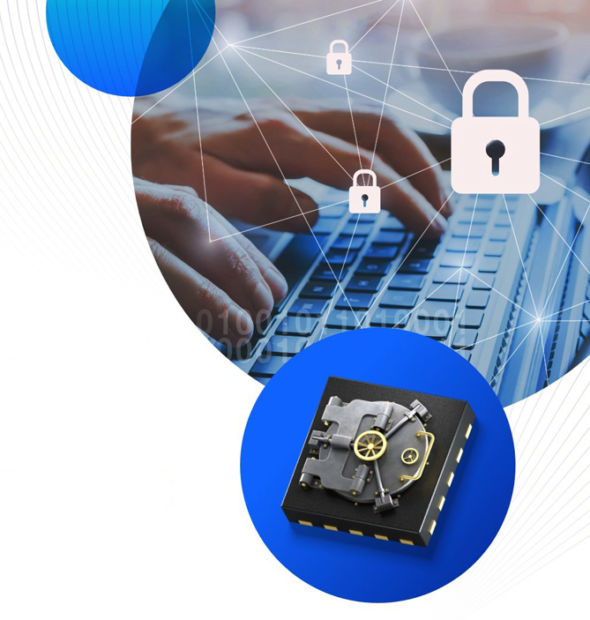Silicon Labs helps implement zero trust for IoT
- September 22, 2021
- Steve Rogerson

Texas electronics company Silicon Labs has announced security services to help IoT companies implement zero trust architectures to meet emerging cyber-security standards and combat threats.
The offerings complement the firm’s Secure Vault technologies with a custom part manufacturing service (CPMS) for wireless SoCs and modules. CPMS is a secure provisioning service that helps IoT developers customise their connected products with security features to safeguard hardware, software and ecosystems.
The offering also includes software development kit (SDK) support services for up to ten years, covering an IoT product’s lifecycle.
According to Omdia’s Enterprise IoT 2021 Survey, IoT security concerns grew 13% in the past year among executives deploying IoT projects. High-profile breaches and hacks of critical infrastructure and household devices have also raised quality concerns among consumers, with malware IoT attacks increasing 59% in the first six months of 2021 compared with the same period last year.
“Developers face a daunting challenge driving innovation in IoT products for homes and industries while securing them against ever evolving threats,” said Matt Johnson, president of Silicon Labs. “Trusted security hardware and software are critical to their success. The days when simple password protection for authentication was sufficient are long gone. Our new security services make it easier for developers to implement custom hardware identities and trusted over-the-air security stack updates to reduce the risk of software, hardware and wireless access vulnerabilities.”
With the security services, IoT companies can protect against security breaches, intellectual property compromises and counterfeiting. The services also support global cyber-security and communication standards, such as the US executive order mandating the implementation of zero trust security architectures, as well as Matter and Wi-Sun requirements for secure identities.
A web portal for CPMS makes it easy for developers to provision Silicon Labs wireless SoCs and modules securely with Secure Vault technology features such as secure boot and secure debug, as well as a secure OTA (over-the-air) bootloader, user specific keys, standard flash programming and custom identities for zero trust architectures.
The long-term SDK support service also reduces the need for expensive re-testing and re-certification activities due to code changes and ensures select Silicon Labs GSDK releases are maintained and supported for up to ten years with security patches and bug fixes.
Launched in 2020, Secure Vault is a suite of features designed to help connected device manufacturers address escalating and ever-evolving IoT security threats and regulatory pressures. Secure Vault has earned the ioXt Alliance SmartCert certification for its IoT security protection. The ioXt Alliance, a global standards body for IoT security, selected PSA Certified as a foundational root-of-trust scheme in its certification programme in October 2020.This year, Secure Vault achieved PSA Certified level-three.

The company has also announced its Unify SDK, which provides the common building blocks for connectivity across IoT ecosystems. IoT cloud and platform developers will be able to design capabilities into their devices and gateways with confidence those products will interoperate across current and emerging wireless protocols.
The Unify SDK will offer ready-made protocol-specific translations for Z-Wave and Zigbee today with plans for Bluetooth, Thread, OpenSync and Matter, simplifying IoT wireless network interoperability and supporting companies as they scale smart home, city, building and industry ecosystems.
“Silicon Labs’ Unify SDK brings the industry one step closer to a world where all IoT wireless devices work together easily across industries and in the home,” said Johnson. “With its design once, support all capability, the Unify SDK accelerates time-to-market, streamlines maintenance and future-proofs investments by simplifying the process for updates. For the first time, IoT providers will be able to develop and maintain a single software code base for IoT devices, including gateways, and easily add wireless protocol support when desired.”
Silicon Labs’ Unify SDK arrives as the IoT market experiences explosive growth, while grappling with a wide array of wireless protocols and more than 600 IoT platforms worldwide. The IoT industry is poised to approve Matter, a unifying connectivity standard. In anticipation, IoT developers can use the Unify SDK to continue to advance their products and platforms and, upon the standard’s approval, enable cross-platform wireless communication with Matter devices.
For example, a Zigbee-based smart speaker could perform a Unify SDK software upgrade to enable Matter, then run both protocols simultaneously, preserving existing investments and allowing for new wireless technologies.
Matter is backed by Apple, Amazon, Comcast, Google, Schneider Electric and numerous other ecosystem players. The Unify SDK will help accelerate industry adoption of Matter and the subsequent scaling of IoT platforms to communicate across ecosystems and wireless protocols.
More than 15 million IoT gateway products developed using Silicon Labs’ series one and two wireless products, which are at the core of the Unify SDK, will be Matter-compatible once it is approved for market availability. Similarly, companies can choose to develop IoT products using the Unify SDK for existing wireless protocols, including Zigbee and Z-Wave, and later leverage the SDK to activate Matter network communication on their product portfolios when the timing is right.
“The complexity of developing products for wireless connectivity may be reaching its peak,” said Lee Ratliff, senior principal analyst with Omdia. “With Matter edging closer to market availability and wireless development tools becoming more protocol-neutral, we’re entering an era of simplified wireless development. The demand for connectivity across a wide spectrum of sectors continues to escalate rapidly. As IoT technology advances, the burden on developers will decrease, and we can expect to see even better performing, more intelligent applications in the future.”
Unify SDK simplifies and speeds development by providing a common, well-defined data model API and status definitions for commonly used IoT services, such as adding, updating and removing a device. The protocol drivers translate the common IoT services into protocol-specific formats, such as Zigbee and Z-Wave. It eases interoperability between wireless IoT protocols by delivering a modular and extensible set of software components provided as source code.
Many IoT applications could benefit from Unify SDK including gateways, wireless access points, hubs, bridges and host processor-based end products such as smart speakers, thermostats, smoke alarms and cameras.
Unify SDK for Z-Wave and Zigbee is available today. Bluetooth, Thread, Matter and more protocols will be added through 2022. The downloads are available through GitHub.




